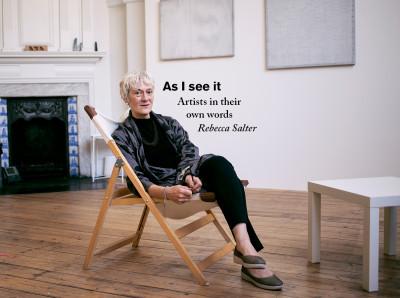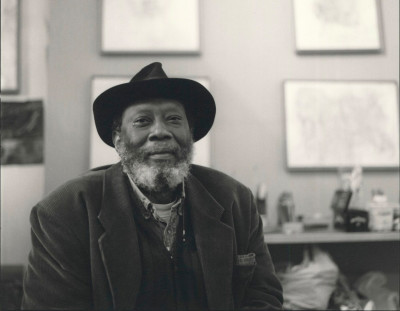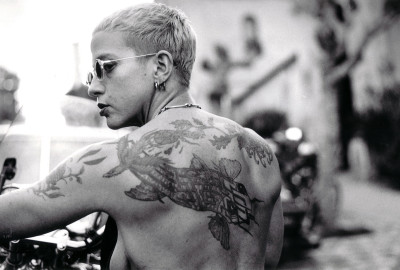Frank Bowling: “I realised that girls liked me at art school.”
Frank Bowling: “I realised that girls liked me at art school.”
Published 5 June 2019
With the British-Guyanese artist’s major retrospective at Tate Britain this year, we meet Frank Bowling in his London home to hear his thoughts on painting, family, and the secret to staying alive.
-
-
I used to run away a lot.
I grew up in Guyana. My mother was a dressmaker; she was very keen for me to appear dignified and smart. My father was a senior policeman, though his clothes reminded me of a pantomime joke. Sometimes I would rather spend the night out in the bush than at home.
I came to England aged 19.
I had hardly any money so when I registered to go to night school at the polytechnic, I was advised to go to the labour exchange to find out if there’s part-time work in the factories. In Guyana I was a delivery boy on my carrier bike, so I carried on doing that in London.
Becoming a painter started in the RAF.
Most of the time I was just a skivvy, like many of us working class boys who joined. But I met [the painter] Keith Critchlow there and he wanted me to sit for him and his father. He revealed recently that it was because he really wanted to find out what a black person looks like. His father’s portrait of me is upstairs in my bedroom. I love it, it’s very revealing. I look like Harry Belafonte, only a little more dusky, a little more brown.
I got my confidence at art school.
People saw something in me that they kind of liked. I felt confident about myself, I realised that girls liked me (and I liked them back), so part of my identity was this chap who girls felt comfortable with. And that in turn made me feel comfortable with everyone.

-
-
We were taught that subject matter is what painting’s all about.
The big test was the one who had the most exciting subject matter – which turned out to be me, because of growing up in some startling circumstances. But when you’re painting, you have to find a way to make that into another language. My painting is inventive and bold. It’s not trained like an illustrator’s talent. Most of the people at art school were mystified by the wild brushstrokes and the colour. They just painted cabbage fields.
I’m always trying to prove myself to my wife.
Rachel is an artist too, so I fear her looking down her nose at my antics. It’s like I’m always jumping about, doing cartwheels, trying to impress her. The beauty is that I feel in competition with her and as always, she’s completely disinterested.
-

Frank Bowling RA, Ziff, 1974.

Frank Bowling RA, Ah Susan Whoosh, 1981.

Frank Bowling RA, Sacha Jason Guyana Dreams, 1989.
-
I still go to the studio everyday.
When I don’t go, it’s because I’m allowing myself to feel unwell, perhaps unloved. It makes me feel slightly nauseous. When I’m in the studio I’m having a good time, but the rest of the time? I stay home and lie down and cogitate about what I’m doing here. I eat my food, I have a drink… What else is there?
I’m often insomniac.
Even if I get through seven ounces of liquor, I still can’t sleep. My mind’s thinking about the work; I’m making paintings on the ceiling.
Being with family is like sinking into a warm bath.
I can’t do without family. I’ve tried to get them all nearby. My most happy times – aside from being in the studio – are when the children and grandchildren are around.
-
-
My body doesn’t let me go all-out anymore.
I’ve had years of stooping and bending, pouring and chucking, beating my body about, working long hours, abusing my rather more delicate parts… I’ve been drinking rum since I was eleven so my body’s deteriorating after years of hard liquor. The booze gets to your liver and it starts to look like a prawn, a shrimp. It doesn’t do much nowadays.
I think aloe vera keeps me alive.
I try to mix alcohol with the aloe veras we have growing in the living room. The booze is pure sugar and I think I’m doing myself a favour by matching it with the bitters. I think one of the things that’s very evident is that I should have been dead by now, and it seems to me that aloe vera is one of the things that keeps me going.

-
-
Inside Frank Bowling RA's home

“I like what I see everyday, which is this jungle that Rachel has created.”

“The living room is filled with art by me, Rachel, our kids, grandkids, old friends...”

“If you live where you work, you work the whole time. At least now I have to cross the river to get to the studio.”

“Often bits and pieces from my home get into the paintings – things that the girls leave behind, little figures that Rachel’s made...”
-
As told to Alice Primrose. All photos by Hollie Fernando.
Frank Bowling’s retrospective is at Tate Britain, London, 31 May – 26 August 2019.
-
-
Read more about Frank Bowling's career
Get to know Frank Bowling’s decades of art-making at the forefront of experimental abstract painting.

-













